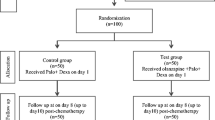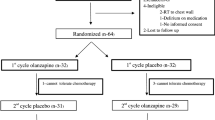Abstract
Background There is limited data on specific antiemetic protocols for control of chemotherapy-induced nausea/vomiting (CINV) caused by weekly cisplatin regimens. Olanzapine is an active agent against CINV and may offer better control of nausea compared to aprepitant/fosaprepitant-based regimens. The usual antiemetic dose of olanzapine (10 mg for four days) causes problems with drowsiness. A lower dose may be as effective with lesser side effects in patients receiving weekly cisplatin. Objective To assess the control of nausea, vomiting, and occurrence of side effects with a modified olanzapine-based antiemetic regimen among patients with carcinoma of the cervix receiving concurrent cisplatin with pelvic radiotherapy. Setting Tertiary cancer hospital in Southern India. Methods We used a modified regimen “mini-OPD”, oral olanzapine (5 mg) days 1 and 2, intravenous palonosetron (0.25 mg) and dexamethasone (12 mg) on day 1 of cisplatin administration in patients with carcinoma of the cervix receiving concurrent chemoradiotherapy with weekly cisplatin (40 mg/m2/week). At our centre, these patients remained inpatients throughout chemoradiotherapy. CINV-related outcomes were captured in the patients’ records by the treating physician in the subsequent week (up to 6 times per patient depending on the number of cycles). We audited these records to calculate the complete response (CR defined as no emetic episodes and no use of rescue medication) rate. Main outcome measure Grades of nausea, vomiting, and drowsiness as per CTCAE v4.0. Results Data of 65 patients (median age: 48 years) who received mini-OPD regimen (median doses of cisplatin/patient: 4) was available. The CR rate was 55%. Considering all cycles together (217 weekly assessment points), “no nausea” target was attained in 125 (58%) assessments and “no vomiting” in 168 (77%). There were no significant side effects. Conclusions The mini-OPD regimen is an inexpensive, non-toxic and effective regimen for the prevention of CINV in patients receiving weekly cisplatin concurrent with pelvic radiotherapy.


Similar content being viewed by others
References
Bloechl-Daum B, Deuson RR, Mavros P, Hansen M, Herrstedt J. Delayed nausea and vomiting continue to reduce patients’ quality of life after highly and moderately emetogenic chemotherapy despite antiemetic treatment. J Clin Oncol. 2006;24(27):4472–8.
Ballatori E, Roila F. Impact of nausea and vomiting on quality of life in cancer patients during chemotherapy. Health Qual Life Outcomes. 2003;1:46.
Ruhlmann CH, Belli C, Dahl T, Herrstedt J. Palonosetron and prednisolone for the prevention of nausea and emesis during fractionated radiotherapy and 5 cycles of concomitant weekly cisplatin-a phase II study. Support Care Cancer. 2013;21(12):3425–31.
Navari RM, Gray SE, Kerr AC. Olanzapine versus aprepitant for the prevention of chemotherapy-induced nausea and vomiting: a randomized phase III trial. J Support Oncol. 2011;9(5):188–95.
Navari RM, Nagy CK, Le-Rademacher J, Loprinzi CL. Olanzapine versus fosaprepitant for the prevention of concurrent chemotherapy radiotherapy-induced nausea and vomiting. J Community Support Oncol. 2016;14(4):141–7.
Mizukami N, Yamauchi M, Koike K, Watanabe A, Ichihara K, Masumori N, et al. Olanzapine for the prevention of chemotherapy-induced nausea and vomiting in patients receiving highly or moderately emetogenic chemotherapy: a randomized, double-blind, placebo-controlled study. J Pain Symptom Manage. 2014;47(3):542–50.
Chiu L, Chow R, Popovic M, Navari RM, Shumway NM, Chiu N, et al. Efficacy of olanzapine for the prophylaxis and rescue of chemotherapy-induced nausea and vomiting (CINV): a systematic review and meta-analysis. Support Care Cancer. 2016;24(5):2381–92.
Mehra N, Ganesan P, Ganesan TS, Veeriah S, Boopathy A, Radhakrishnan V, et al. Effectiveness of olanzapine in patients who fail therapy with aprepitant while receiving highly emetogenic chemotherapy. Med Oncol. 2017;35(1):12.
Common Terminology Criteria for Adverse Events (CTCAE) | Common Terminology Criteria for Adverse Events (CTCAE) | Protocol Development | CTEP [Internet]. [cited 2018 May 12]. https://ctep.cancer.gov/protocoldevelopment/electronic_applications/ctc.htm.
Ruhlmann CH, Christensen TB, Dohn LH, Paludan M, Rønnengart E, Halekoh U, et al. Efficacy and safety of fosaprepitant for the prevention of nausea and emesis during 5 weeks of chemoradiotherapy for cervical cancer (the GAND-emesis study): a multinational, randomised, placebo-controlled, double-blind, phase 3 trial. Lancet Oncol. 2016;17(4):509–18.
Hashimoto H, Abe M, Tokuyama O, Mizutani H, Uchitomi Y, Yamaguchi T, et al. Olanzapine 5 mg plus standard antiemetic therapy for the prevention of chemotherapy-induced nausea and vomiting (J-FORCE): a multicentre, randomised, double-blind, placebo-controlled, phase 3 trial. Lancet Oncol. 2019. https://doi.org/10.1016/S1470-2045(19)30678-3.
Acknowledgements
We thank Dr Jayachandran P.K and all the residents in the Department of Medical Oncology, Cancer Institute (WIA).
Funding
The study was supported by the Cancer Institute (WIA) funds. No grant number is applicable.
Author information
Authors and Affiliations
Corresponding author
Ethics declarations
Conflicts of interest
The authors declare that they have no relevant conflicts of interests to declare.
Additional information
Publisher's Note
Springer Nature remains neutral with regard to jurisdictional claims in published maps and institutional affiliations.
Rights and permissions
About this article
Cite this article
Mehra, N., Christopher, V., Dhanushkodi, M. et al. A modified olanzapine-based anti-emetic regimen for the control of nausea and vomiting in patients receiving weekly cisplatin. Int J Clin Pharm 42, 662–666 (2020). https://doi.org/10.1007/s11096-020-00997-3
Received:
Accepted:
Published:
Issue Date:
DOI: https://doi.org/10.1007/s11096-020-00997-3




